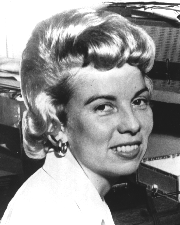Page 75
[Begin Tape 1, Side A]
Ritchie: Iris, I thought we'd start today by talking about the various positions you've held during your forty-plus-year career. I have some general questions about each of the positions. Your first was in Hattiesburg, Mississippi, with the Hattiesburg American in 1948?
Kelso: 1948 to '51, when I came to New Orleans. And I've worked for daily newspapers, for television, and for alternative papers over that period. I started out with the Hattiesburg American, then came to the New Orleans States, it was then. [It] later became the States-Item, now is combined with the Times-Picayune. I stayed there for a long time. In '65 went to work with Total Community Action, which was the poverty program agency. In '67 went to work for WDSU-TV, then in '79 began some work with an alternative paper, Figaro, later Gambit. Then to the Times-Picayune. A taxi cab driver asked me one time did I get fired from all those jobs. I was happy to tell him no, not from any of them.
Ritchie: How did he know you'd had so many? Were you chatting?
Kelso: I had known him a long time. I ride cabs all the time, so I know a lot of taxi cab drivers.
Ritchie: Your first position was in 1948 and that was a time right after the war when a lot of women were let go from positions they'd held during the war. Was your situation a little unique as being someone who was hired at that time?
Kelso: I didn't think of it as that. As a matter of fact, I didn't even know that women had been fired or let go afterward, but I came on right after college and my editor was especially interested in training young people, so he gave me a lot of training and helped me a lot. Then he sent me on to New Orleans to some friends of his who were the two editors of the New Orleans States.
Ritchie: It was a small newspaper?
Kelso: The Hattiesburg American? Yes, small, but a very good one, I thought, with some serious standards about news. I think my editor was a very unusual man, Andrew Harmon. It was a grand experience for me because I covered everything. I wrote some society, I wrote country correspondence—that was a wonderful thing—from Petal, Mississippi. I would write how someone had visited her friend for the weekend—big news. And sometimes I think that some of the news I write now sounds like country correspondence. But everybody got their name in the paper. I also did courts, did some police, did interviews. It was a very wide experience and I was glad for that.
Ritchie: Were you the only woman on the news staff?
Kelso: Yes, part of the time I was. Women did all the society news. All the members of the [news] staff [were men], except for myself and another woman for part of the time. We were the only ones [women] on the news staff.

